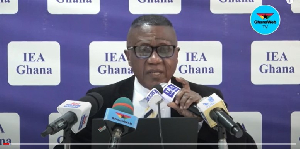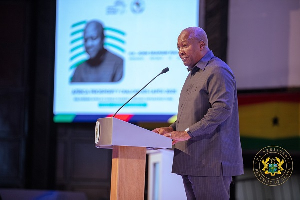Accra, June 5, GNA - The Teachers and Educational Workers Union (TEWU) of the Trades Union Congress (TUC) on Monday declared an indefinite strike action to press its demands for better conditions of service.
Mr Dan Ayim Antwi, General Secretary of TEWU, said at a press conference in Accra that its members were not strike-mongers but the inactions of the Management of the Ghana Education Service and the National Labour Commission (NLC) were causing industrial unrest in the GES and the Polytechnics and agitations in public universities. He said the strike action did not immediately include its members in the universities but if by June 16, 2006 the salary arrears on the 20 per cent increase for Senior and Junior Staff of the public universities were not paid, they would also join.
Mr Antwi said until the GES Management and the Government attended to the plight of its members they would continue to lay down their tools.
Giving the background to the development, Mr Antwi said the Union submitted 18 point-proposal to the Management on the review of its collective bargaining agreement in 2002, adding that the Management also gave other 52 proposals.
He said out of these only four out of the 70 proposals from the Union and Management were pending. These included salary review from TEWU; risk allowances from TEWU; end of service benefit from TEWU and withdrawal of responsibility allowances from GES. "One will, therefore, think that Management feels contented with the current status of the negotiations and finds it unnecessary to negotiate any further."
Mr Antwi said the Union had tolerated Management's uncooperative attitude for so long, especially considering the number of memoranda of understanding that both sides had signed during the past five years to reaffirm their commitment to collective bargaining.
He also referred to the number of complaints the Union had filed with National Labour Commission (NLC) about Management's unacceptable attitude as well as the number of times the NLC had directed the Management to resume negotiations with the Union.
He said reports indicated that members were either being intimidated or insulted by certain heads of institutions; units and offices of the GES and warned those heads to steer clear of the Union if they would like to see an amicable resolution of the impasse between GES and TEWU.
Mr Antwi said the Union had held several meetings with the GES Management but to no avail and had to report Management's uncooperative attitude to the NLC on August 1, 2005 for it to prevail upon them to resume negotiations with Union.
He said though the NLC directed the Management to meet the Union on negotiations it had not been able to resolve the issue.
In an interview with the Ghana News Agency, Mr Michael Kenneth Nsowah, Acting Director General of the GES, said at its December 2005 and May 2006 meetings between the Management and TEWU on the issues raised, GES submitted the reviewed conditions of service including responsibility and risk allowance to the Ministry of Finance and was awaiting a response.
He said end of service benefits were frozen in 1990 but this present Government had tasked employers and trade unions to negotiate, adding that since the employer had no budget for such payment, the mandate would have to be sought from the Ministry of Finance. Mr Nsowah said TEWU had demanded 40 per cent salary increase and it was referred to the present 20 per cent salary increase for all public servants but their response was that they still stood by their demand for 40 per cent increase.
He said GES had made several follow-ups to the Ministry of Finance and considerable progress had been made, adding that the Management had been able to secure the mandate and TEWU must reciprocate by cooperating and returning to work.
Mr Nsowah, therefore, called on the Ministry of Manpower to come out to explain how the restored end of service benefit could be worked out and the Government's position on the issue.
He said the Ministry of Finance, which had the mandate to decide on salaries, should come out openly to say what workers' entitlements were so that unions and management would be clear on the issues at stake.
General News of Monday, 5 June 2006
Source: GNA
















